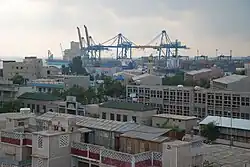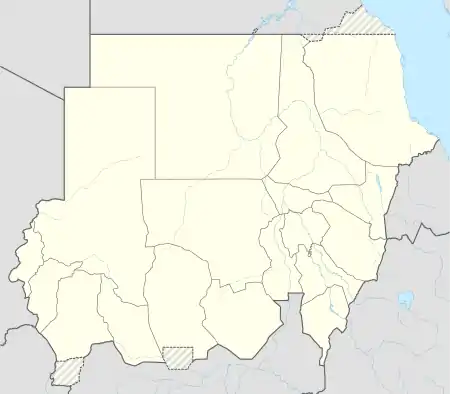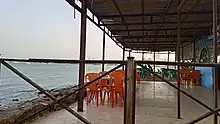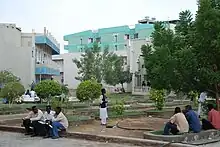Port Sudan
Port Sudan (Arabic: بور سودان, romanized: Būr Sūdān, Beja: Bar'uut) is a city and port on the Red Sea in eastern Sudan, and the capital of the state of Red Sea. Port Sudan is Sudan's main seaport and the source of 90% of the country's international trade.[2] The population of Port Sudan was estimated in the 2008 Census of Sudan to be 394,561 people.[3]
Port Sudan
بور سودان Bar'uut | |
|---|---|
City | |
 Port Sudan Harbor | |
 Port Sudan Location in Sudan | |
| Coordinates: 19°37′N 37°13′E | |
| Country | |
| State | Red Sea |
| Population (2023) | |
| • Total | 517,000[1] |
Port Sudan has historically been a center for commercial activity, particularly in the shipping industry.[4] In the 21st century, Port Sudan has emerged as a refuge for internally displaced persons in Sudan.[5]
History
Port Sudan was built between 1905 and 1909 by the administration of Anglo-Egyptian Sudan to replace Suakin—the historic, coral-choked Arab port.[6] An oil pipeline was built between the port and Khartoum in 1977.
In 2009, Israel allegedly used naval commandos to attack Iranian arms ships at Port Sudan as part of Operation Birds of Prey.[7] In 2020, Russian president Vladimir Putin announced that the Russian Navy would begin construction on a base with capacity for 300 personnel and four warships in Port Sudan. The facility would provide Russia with a naval base in the nation for at least 25 years.[8] The plan was ultimately suspended, though Sudanese leadership has indicated that it is possible for the construction to go ahead in the future.[9]
In 2016, it was reported that residents of Port Sudan face water scarcity.[10] Following the October–November 2021 Sudanese coup d'état, the Beja tribal council initiated a weeklong blockade of the city's ports. Following negotiations with military officials, the blockade was lifted.[11]
Refugee settlement
During the 2023 Sudan conflict, Port Sudan has emerged as a leading destination for refugees fleeing war.[4] Internally-displaced refugees in the city reportedly face extreme heat and shortages of food and water.[12]
Economy

The city has an oil refinery and handles 90% of the country's international trade.[6][2] Major exports include oilseed, senna, and hides and skins. Imports include construction materials, heavy machinery, and vehicles.
Transport
The city has a modern container port to handle imports and exports.[6] The port is part of the 21st Century Maritime Silk Road that runs from the Chinese coast via the Suez Canal to the Mediterranean, there to the Upper Adriatic region of Trieste with its rail connections to Central and Eastern Europe.[13][14][15][16]
The main airport is Port Sudan New International Airport. There is now a tarred road linking Port Sudan to Khartoum via Atbara. Port Sudan also has a 1067mm gauge rail link with Khartoum. There is also an international ferry from Jeddah.
In 2023 a new seaport was proposed about 200km north of Port Sudan at Abu Amama.[17] A 450km road to the farming hub at Abu Hamad would also be provided. This new seaport is opposite Jeddah which shortens the ferry trip from Jeddah.
Education

The city is home to the Red Sea University, established in 1994.[18]
Places of worship
Places of worship are predominantly Muslim mosques,[19] but there are also Christian churches and temples including the Roman Catholic Archdiocese of Khartoum (Catholic Church), Sudan Interior Church (Baptist World Alliance), and Presbyterian Church in Sudan (World Communion of Reformed Churches).
Climate
Port Sudan has a hot desert climate (Köppen: BWh) with extremely hot summers and moderately hot winters, requiring the acquisition of fresh water from Wadi Arba'at in the Red Sea Hills and from salt-evaporating pans. Temperatures can easily exceed 30 °C (86 °F) in winter and 45 °C (113 °F) in summer. Over 90% of the annual rainfall falls between October and January, mostly in November, with the wettest month on record being November 1947 with 182 millimetres (7.2 in), whilst the wettest year was from July 1923 to June 1924 with 231 millimetres (9.1 in). Average annual rainfall is 76 millimetres (3.0 in), and no rainfall occurred between January 1983 and June 1984.[20] The mean temperature year round (the average of all daily highs and nighttime lows) is 28.4 °C (83.1 °F).
| Climate data for Port Sudan, Sudan (1961–1990, extremes 1906–present) | |||||||||||||
|---|---|---|---|---|---|---|---|---|---|---|---|---|---|
| Month | Jan | Feb | Mar | Apr | May | Jun | Jul | Aug | Sep | Oct | Nov | Dec | Year |
| Record high °C (°F) | 37.0 (98.6) |
36.6 (97.9) |
40.0 (104.0) |
41.2 (106.2) |
47.0 (116.6) |
46.7 (116.1) |
48.0 (118.4) |
48.6 (119.5) |
46.1 (115.0) |
44.3 (111.7) |
39.0 (102.2) |
38.0 (100.4) |
48.6 (119.5) |
| Average high °C (°F) | 26.8 (80.2) |
27.0 (80.6) |
28.8 (83.8) |
31.4 (88.5) |
35.0 (95.0) |
38.5 (101.3) |
40.1 (104.2) |
40.2 (104.4) |
37.4 (99.3) |
33.4 (92.1) |
30.8 (87.4) |
28.8 (83.8) |
33.2 (91.8) |
| Daily mean °C (°F) | 23.3 (73.9) |
23.0 (73.4) |
24.3 (75.7) |
26.5 (79.7) |
29.3 (84.7) |
32.2 (90.0) |
34.1 (93.4) |
34.5 (94.1) |
32.1 (89.8) |
29.3 (84.7) |
27.3 (81.1) |
24.7 (76.5) |
28.4 (83.1) |
| Average low °C (°F) | 19.7 (67.5) |
19.0 (66.2) |
19.9 (67.8) |
21.6 (70.9) |
23.7 (74.7) |
25.9 (78.6) |
28.2 (82.8) |
28.9 (84.0) |
26.8 (80.2) |
25.3 (77.5) |
23.8 (74.8) |
21.3 (70.3) |
23.7 (74.7) |
| Record low °C (°F) | 10.0 (50.0) |
10.2 (50.4) |
10.0 (50.0) |
12.3 (54.1) |
17.4 (63.3) |
17.2 (63.0) |
20.0 (68.0) |
20.0 (68.0) |
18.9 (66.0) |
17.5 (63.5) |
17.5 (63.5) |
9.0 (48.2) |
9.0 (48.2) |
| Average rainfall mm (inches) | 7.2 (0.28) |
0.9 (0.04) |
0.9 (0.04) |
0.2 (0.01) |
1.1 (0.04) |
0.2 (0.01) |
3.8 (0.15) |
1.4 (0.06) |
0.0 (0.0) |
13.9 (0.55) |
35.0 (1.38) |
10.0 (0.39) |
76.1 (3.00) |
| Average rainy days (≥ 0.1 mm) | 1.2 | 0.2 | 0.2 | 0.3 | 0.3 | 0.1 | 0.8 | 0.3 | 0.0 | 1.2 | 4.1 | 1.7 | 10.4 |
| Average relative humidity (%) | 69 | 70 | 69 | 65 | 58 | 50 | 49 | 50 | 60 | 72 | 72 | 71 | 63 |
| Mean monthly sunshine hours | 195.3 | 226.8 | 282.1 | 306.0 | 322.4 | 285.0 | 272.8 | 288.3 | 282.0 | 297.6 | 225.0 | 213.9 | 3,197.2 |
| Mean daily sunshine hours | 6.3 | 8.1 | 9.1 | 10.2 | 10.4 | 9.5 | 8.8 | 9.3 | 9.4 | 9.6 | 7.5 | 6.9 | 8.8 |
| Percent possible sunshine | 57 | 68 | 75 | 80 | 80 | 72 | 67 | 68 | 78 | 82 | 69 | 63 | 72 |
| Source 1: NOAA,[21] Hong Kong Observatory,[22] | |||||||||||||
| Source 2: Meteo Climat (record highs and lows)[23] | |||||||||||||
Demographics
| Year | Population |
|---|---|
| 1906[24] | 4,289 |
| 1941 | 26,255 |
| 1973 | 132,632 |
| 1983 | 209,938 |
| 1993 | 305,385 |
| 2007 (est.) | 489,275 |
| 2008 (est.) | 517,338 |
The population consists mainly of Sudanese Arabs, including the native Beja people, with small Asian and European minorities.[6]
Sport
Hay Al-Arab SC founded in 1928, and Hilal Alsahil SC founded in 1937, both play at the Port Sudan Stadium in the football Sudan Premier League. The city's third team is Al-Merreikh Al-Thagher.
Notable people
- Gawaher (Pop singer)
- Ra'ouf Mus'ad (Playwright)
Notes
- "Bur Sudan, Sudan Metro Area". Retrieved 17 September 2023.
- Eltahir, Nafisa; Abdelaziz, Khalid; Saul, Jonathan (2021-12-23). "Sudan's Red Sea port struggles to recover from blockade and turmoil". Reuters. Retrieved 2022-04-22.
- "City Population in Sudan". Retrieved 6 September 2023.
- Milton, Immanual John (2023-06-20). "CityLab Daily: Port Sudan Becomes Haven for Refugees Fleeing War". Bloomberg. Retrieved 2023-06-20.
- Jamal, Urooba (2023-05-03). "Port Sudan, a Red Sea refuge for many fleeing Sudan's violence". Al Jazeera. Retrieved 2023-06-22.
- "Port Sudan | Facts". Encyclopedia Britannica. Retrieved 2018-11-02.
- Ynet (2009-04-08). "Report: Naval commando forces involved in Sudan strike". Ynetnews. Retrieved 2022-11-26.
- Foy, Henry; Schipani, Andres (November 16, 2020). "Russia to build naval base in Sudan". The Financial Times. Archived from the original on November 20, 2020. Retrieved November 20, 2020.
Russia will build a naval base on Sudan's Red Sea coast, its first in Africa, as the Kremlin seeks to expand its global military footprint and cement its burgeoning trade and defence ties with the continent. The Russian navy has been directed to proceed with plans to construct a base for 300 personnel and space for up to four warships, including nuclear-powered vessels, according to an order signed by president Vladimir Putin on Monday.
- Phillips, Michael M. (2022-03-02). "U.S. Worries Sudan Is Close to Leasing Russia a Red Sea Base". Wall Street Journal. ISSN 0099-9660. Retrieved 2022-04-22.
- "Port Sudan's water shortage worsening - Sudan | ReliefWeb". reliefweb.int. 2016-06-16. Retrieved 2023-06-20.
- "Sudan tribal protesters lift port blockade, week after coup". AP NEWS. 2021-11-01. Retrieved 2022-04-22.
- VOA60 Africa - Displaced Sudanese in Port Sudan suffer from extreme heat, food and water shortages, 2023-05-15, retrieved 2023-06-20
- "China's 'Maritime Silk Road': Don't Forget Africa". thediplomat.com.
- See also: Harry G. Broadman "Afrika´s Silk Road" (2007).
- "Implications for Africa from China's One Belt One Road Strategy". africacenter.org.
- "China's Belt and Road Initiative beacons new trade in MENAT". www.business.hsbc.ae.
- "Sudan to develop Red Sea port in $6-bln initial pact with Emirati group". Reuters. 2022-12-13. Retrieved 2023-07-11.
- "Red Sea University". African Studies Center. Archived from the original on 2011-08-12. Retrieved 2011-09-17.
- Britannica, Sudan, britannica.com, USA, accessed on July 7, 2019
- "Monthly Rainfall for Port Sudan (#62641)". climexp.knmi.nl.
- "Port Sudan Climate Normals 1961–1990". National Oceanic and Atmospheric Administration. Retrieved January 24, 2015.
- "Climatological Information for Port Sudan, Sudan". Hong Kong Observatory. Archived from the original on 2012-03-20. Retrieved 2015-10-28.
- "Station Port Soudan" (in French). Meteo Climat. Retrieved 22 October 2016.
- Chisholm, Hugh, ed. (1911). . Encyclopædia Britannica. Vol. 22 (11th ed.). Cambridge University Press. p. 133.
References
- Arckell, A. J., UNESCO General History of Africa, History of Darfur 1200-1700 A.D. SNR.
- Encyclopædia Britannica, "Port Sudan" (description), 2007, webpage: EB-PortSudan.
- Michael R. T. Dumper; Bruce E. Stanley, eds. (2008), "Port Sudan", Cities of the Middle East and North Africa, Santa Barbara, Cal.: ABC-CLIO, ISBN 9781576079195
External links
 Media related to Port Sudan at Wikimedia Commons
Media related to Port Sudan at Wikimedia Commons